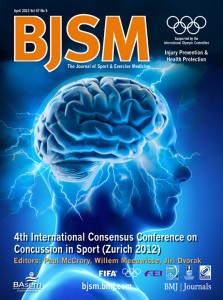The Faculty of Sport and Exercise Medicine (FSEM) in the UK calls for further research into any possible relationship between early onset dementia and contact sports with a risk of head injury/head impacts.
Research is needed to better understand the way in which brains may be damaged after a sporting head injury and the time course to recovery. The short, medium and long term consequences of head injuries during sport can be far reaching and concussion management in particular needs to be regularly reviewed through international consensus and clear standards adopted across all sports. A co-ordinated research strategy to establish both the risk of Early Onset Dementia in the general population and the retired sporting population, as well as prospective studies following up players after their playing careers have ended, would be welcomed.
Dr Mike Loosemore Fellow of the FSEM, Consultant at the Institute of Sport, Exercise and Health, University College London and Doctor to The British Boxing Team comments:
“There is an association between serious head injury and dementia; however the evidence of dementia following concussion is not there. There is also the problem of attribution; just because an ex-player has developed dementia does not mean that the dementia was caused by their exposure to a particular sport. So if a patient who has dementia following a severe head injury also played a high impact sport, which group would they be in?”
Whilst the possible long term consequences of head injury are being researched, the Faculty believes that it is important that 4 key messages of concussion management are understood and implemented:
- The critical importance of recognising and removing the concussed player from play is highlighted, along with the importance of the player not returning to play the same day.
- The principle of monitoring a concussed player’s progress through a graded return to play only once the player is symptom free is also highlighted.
- A more conservative approach to the management of the age-group player is being adopted by many sporting organisations. Sports Physicians with expertise in concussion management are uniquely placed to co-ordinate the care of the athlete who has suffered a concussion.
- Best practice clinical pathways from injury to return to school and play for the concussed player outside of the elite sports setting are not easily accessible in the UK and the Sports Physician with expertise in concussion management is well placed to develop this locally in collaboration with other healthcare professionals.
The Faculty will be working with its Members and Fellows to raise awareness about concussion management and together with other sporting organisations and national governing bodies look to align standards of management.
The Faculty believes that best practice concussion management should be data driven wherever possible and stresses the value of adopting a full an open risk management process where a data driven risk assessment drives practice and is openly communicated to the public and media. Concussion is an emotive topic where strong opinions are often held and injudicious reporting of risk can strongly and negatively impact on player participation rates and could lead to adverse health outcomes.
The BJSM is the primary host journal for the 2013 publication on Concussion in Sport: Consensus statement on concussion in sport: the 4th International Conference on Concussion in Sport held in Zurich, November 2012 is available here (Open Access) and has had over 40,000 full-text views.

Click here to view the International Rugby Board’s guidelines for on-field concussion
Click here to view the Rugby Football Union’s concussion guidance and here to access the HEADCASE resource
Notes to Editors:
- The Faculty of Sport and Exercise Medicine was launched in 2006 and is an intercollegiate faculty of the Royal College of Physicians of London and the Royal College of Surgeons of Edinburgh
- The Faculty has over 550 Members and Fellows, not including medical students
- There are around 70 SEM specialists registered with the General Medical Council
- The FSEM not only sets standards in SEM but oversees research, training, curriculum and assessment of SEM Doctors, including providing revalidation services
- Sport and Exercise Medicine involves the medical care or injury and illness in sport and exercise. It requires accurate diagnoses, careful clinical examination, experience and knowledge of sport and exercise specific movement patterns. SEM practitioners work in a variety of settings across primary, secondary and tertiary care. The specialty has a large scale application in improving the health of the general public through exercise advice and prescription. Further information about the specialty can be found in the Media & Resources section at www.fsem.co.uk
Follow FSEM on Twitter @FSEM_UK
Link to FSEM on Linkedin
For further information contact Beth Cameron, PR & Communications for the Faculty of Sport and Exercise Medicine;
Email: pr@fsem.ac.uk, Tel: 0131 527 3498, Mobile: 07551903702
Web: www.fsem.co.uk